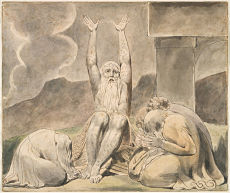167 - When Bad Things Happen to Good People: Suffering in Jewish Philosophy
Posted on
The Book of Job provokes Saadia, Maimonides, Ibn Tibbon and Gersonides to reflect on why God allows suffering.
Themes:
Further Reading
• R. Eisen, The Book of Job in Medieval Jewish Philosophy (Oxford: 2004).
• A.L. Lassen, The Commentary of Levi ben Gersom (Gersonides) on the Book of Job (New York: 1946).
• O. Leaman, Evil and Suffering in Jewish Philosophy (Cambridge: 1995).
• E.I.J. Rosenthal, “Saadya’s Exegesis of the Book of Job,” in E.I.J. Rosenthal (ed.), Saadya Studies (New York: 1980), 177-205.
• T. Rudavsky (ed.), Divine Omniscience and Omnipotence in Medieval Philosophy (Dordrecht: 1985).

Andalusia


 ..
..



Comments
Thanks
Hi Peter,
thanks for this episode - very interesting the interpretations. I have always loved the Book of Job and the perspective it brings, particularly about our knowledge of the universe.
What is interesting is that the various interpretations by the Jewish commentators survive to today, and were certainly debated in the Medieval period in Western Europe.
When I was a child I read an annotated version of the book, and the notes seemed to be at pains to indicate that the character of Sátan should be translated as "the accuser" rather than associating him the fallen angel. This is seen when God asks Sátan where he has been, and the reply was that he had been wandering around the Earth and walking here and there.
The text of the book has also inspired musicians and other artists and it used in the funeral rites of Western Christianity: Taedet anima mea coming the Vulgate translation of Job and being one of the readings of the Office of the Dead.
The podcast inspired me to re-read Job, and I thank you for that. I still find the advice from Job's wife, to put his curse upon God and die, a little chilling.
In reply to Thanks by Bear
Satan in Job
Yes, I read this also - that "Satan" is misleading because it conjures up the notion of the devil rather than this specific "accuser" character in the Book. But I am no Old Testament scholar so I don't know how true that is, and it seemed simpler just to call him Satan for the purposes of the podcast.
Glad you enjoyed the episode! I found it one of the most interesting ones to work on so far, actually.
In reply to Satan in Job by Peter Adamson
Satan
In the Hebrew of its pretty clear that "Satan" is a title and not a proper name. It is given as הַשָֹֺטָן (HaShatan) "Ha" is the definite article, which makes the word translate as "The Advesary" rather than as a proper name.
Suffering in Islamic Philosophy
Hi,
You mentioned that suffering was a topic in many region's philosophy. You mentioned Plato's Timeaus, Plotinus, and Origen. And suffering plays a role in Buddhist philosophy (in so far as dukkha can be translated as "suffering"). But was it a part of Islamic philosophy (either Formative, Andalusian, or Eastern)? Or was it only covered in so far as al-Kindi's ethical treatises and Razi's medical ethics covered it?
In reply to Suffering in Islamic Philosophy by Raphael
Suffering
Actually there is a fair amount of discussion of this in the kalam (Islamic theological) tradition, and there is a whole book about this:
Heemskerk, M. T. 2000. Suffering in the Mu'tazilite Theology. 'Abd al-Jabbar’s Teaching on Pain and Divine Justice.
Worth tracking down if you can find a copy. The main issue is of course why God would allow suffering, and the Mutazilites tend to say that God acts as what Heemskerk calls a "cosmic bookkeeper" making up for suffering by rewarding the sufferers in the afterlife, even including animals!
God in the book of Job and curiosity
Hi!
Would it be correct to affirm that the god described in the book of Job is not all-knowing?
I say this because what makes him take away Job's goods is the fact that he doubts Job's loyalty/respect. Therefore, there's something that he doesn't know and he's curious, that's why he makes the experiment and proofs Job.
On the other hand, the view that God is not able to know about future events might as well make easier the providence vs liberty debate.
In reply to God in the book of Job and curiosity by StoicPlato
Book of Job
Yes, I think on the surface level the book does suggest that God and Satan want to "see what happens" when Job is tested so that implies God does not know the future (or at least this future event). But of course exegetical ingenuity could be applied to avoid that implication.
Add new comment